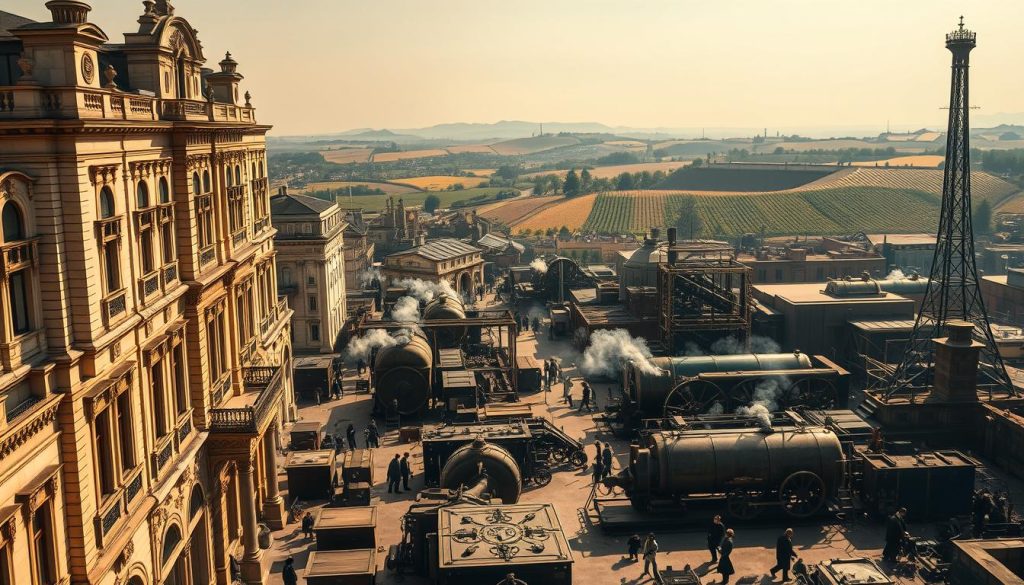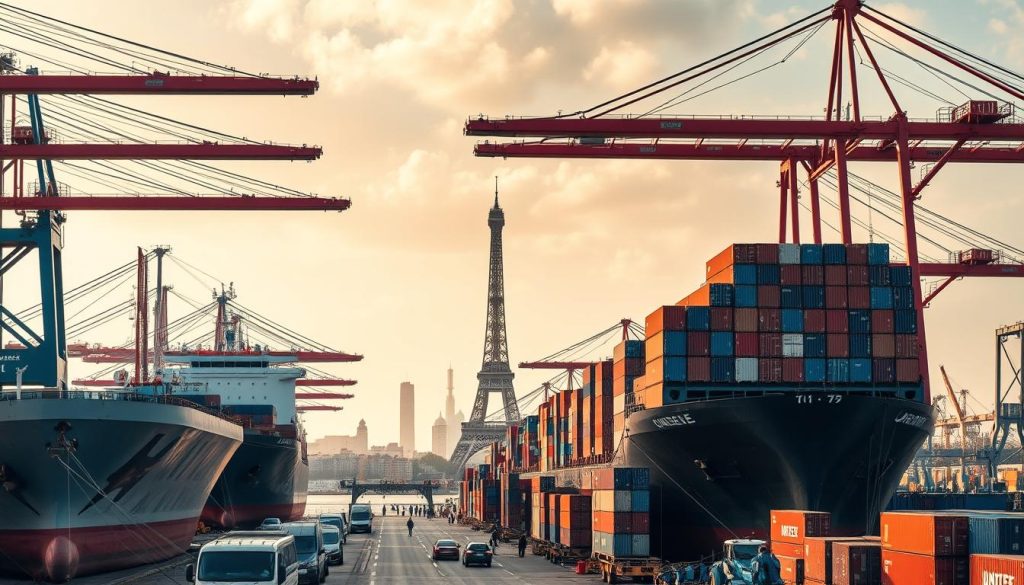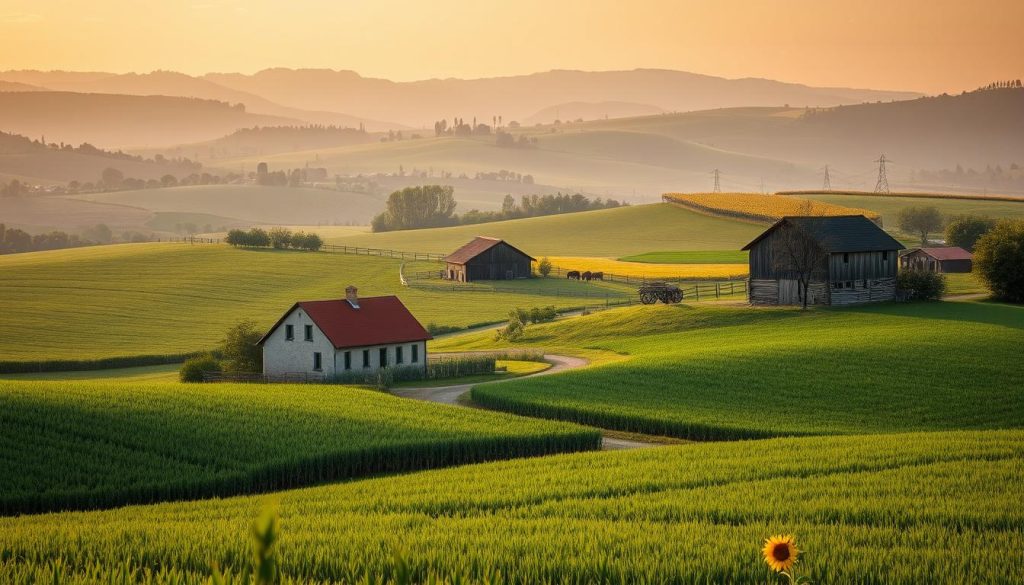In recent years, the French economy has seen a big change. It now has many different industries that are key to its success. These include the manufacturing sector and the famous tourism industry.
This article will look at these major sectors. We’ll see how France stays important in both European and global markets. We’ll also explore the unique business culture and rules in France.
Overview of the French Economy
The French economy is diverse, with many sectors and indicators. We’ll look at key parts of the French economy. This includes GDP growth, inflation rates, and employment figures.
Key Economic Indicators
France’s economy is measured by important indicators. The GDP has changed due to domestic and global factors. Inflation affects how much people can buy, and job numbers show the job market’s health.
- GDP Growth Rate: Varies around 1.5% annually.
- Inflation Rate: Approximately 1.2% as of recent measurements.
- Unemployment Rate: Close to 8%, indicating a challenging job landscape.
Economic Structure
France’s economy has big companies and small businesses. This mix brings strength and new ideas. The service, manufacturing, and agriculture sectors keep the economy going and create jobs.
Recent Trends
France’s economy is recovering after the COVID-19 pandemic. People are shopping online more, changing the market. Businesses are also getting better at using digital tools, changing how they work and interact with customers.
Historical Context of French Business
The history of French business has seen big changes, from the post-war era to today. We can follow the economy’s growth through key events and reforms. These have shaped the business world in France.
Evolution Over the Decades
After World War II, France grew fast, thanks to industry and heavy industries. The 1980s brought a new focus on competition and innovation. This change helped create a good place for entrepreneurs, leading to today’s varied economy.
Major Economic Reforms
In the late 20th and early 21st centuries, France made big changes to its business rules. These reforms aimed to make things more efficient and competitive. They helped France face global challenges and stay competitive worldwide.
Influence of Globalization
Globalisation has greatly affected French businesses. Companies started working with the world, changing their ways to fit global standards. This shift has opened up new markets for French firms but also made them rethink old ways to stay ahead.

Key Industries Driving France’s Economy
The French economy is built on several key industries. These include manufacturing, tourism, and agriculture. The automotive and aerospace sectors are strong in manufacturing. Tourism brings in millions, thanks to France’s beauty and culture. The agricultural sector adds to the country’s wealth with its diverse produce.
Manufacturing Sector
France’s manufacturing has a long history of excellence. Giants like Renault and Airbus create jobs and drive innovation. They use the latest technology and sustainable practices to stay ahead globally. The shift to electric vehicles shows their commitment to the future.
Tourism Industry
The tourism industry is a big part of France’s economy, with 90 million visitors a year. Places like Paris, with its famous landmarks, are key. France’s countryside and historical sites also attract visitors, boosting local economies. The government works to improve tourism through various initiatives.
Agriculture and Food
Agriculture in France is known for its high-quality products, like wines and cheeses. The sector focuses on innovation and sustainability, with more organic farming. French farmers use eco-friendly methods to meet consumer demand. This quality supports local markets and boosts France’s agricultural exports.
The Role of Small and Medium Enterprises (SMEs)
SMEs in France are key to our economy. They create lots of jobs and encourage new ideas. This part talks about how SMEs help with jobs, innovation, and support for these businesses.
Contribution to Employment
Small and medium enterprises are big employers in France. They have over two-thirds of the workforce. This shows how important they are for jobs and economic stability.
Innovation and Startups
SMEs are full of creativity, leading in tech and creative fields. They can quickly change to meet market needs. This makes France’s innovation scene vibrant with new ideas.
Support Systems for SMEs
The French government and others help SMEs a lot. They offer money, training, and advice. This helps small businesses grow and succeed, making France’s economy strong.

The Technology and Innovation Landscape
France’s tech scene is buzzing with new ideas and creativity. The rise of French startups shows a big move towards technology in many areas. These startups show France’s chance to be a leader in tech.
Emerging Tech Startups
The startup world in France is growing fast. Entrepreneurs are exploring new areas like AI, fintech, and healthtech. Cities like Paris are hubs of innovation, drawing in investors and talent from around the world.
This setup helps startups work together. It builds a network that helps them grow and stay strong.
Government Support for Innovation
The government’s role in supporting tech startups is key. It offers grants, tax breaks, and incubators to help research and development. The French Tech Visa helps bring in international talent, boosting the tech scene.
This support helps startups grow and reach new heights.
Impact of Digital Transformation
Digital change is changing old industries and opening up new chances. Companies are using tech to get better, serve customers better, and work smarter. This change is a big step for French businesses, showing they must keep up with the fast pace of the market.
France’s Position in Global Trade
France plays a big role in global trade. It exports a wide range of products, showing off its industrial power. Looking at trade relations helps us see what products are key and the challenges they face.
Major Export Products
France’s exports cover many areas, like luxury goods, machinery, and food. Some top items include:
- Luxury items, including fashion and cosmetics, which are sought after globally.
- Machinery and equipment, showing France’s engineering skills.
- Agricultural exports, like wine and cheese, showing France’s rich food culture.
Trade Agreements and Relations
France is part of many trade agreements, including those with the European Union and other countries. These agreements help trade flow smoothly and open up new markets. Working with countries like Canada, Japan, and the UK strengthens these ties.
Challenges in International Trade
Even with strong exports, France faces trade hurdles. High tariffs, strict rules, and competition from new markets can be tough. France must keep up with these changes to stay competitive.

The Impact of Tourism on Business
Tourism is key to France’s economy, shaping its culture and growth. Famous spots like the Eiffel Tower and the Louvre attract millions yearly. This boosts local businesses and creates jobs.
Attractions Driving Visitors
France’s history, architecture, and culture draw tourists worldwide. Top attractions include:
- The Eiffel Tower
- The Louvre Museum
- Versailles Palace
- Mont Saint-Michel
- Provence Lavender Fields
These sites offer fun and boost the economy through ticket sales and local shopping.
Economic Contributions of Tourism
Tourism is vital to France’s economy. It’s a big part of the GDP, bringing in billions. It also creates many jobs in hospitality and travel.
The tourism growth means more investment in better visitor experiences. This benefits many industries.
Challenges Faced by the Tourism Industry
The tourism sector faces big challenges. The COVID-19 pandemic hit hard, cutting visitor numbers and revenue. It also means changing to meet new visitor needs.
The Agricultural Sector’s Significance
The agricultural sector is key to France’s economy and culture. It offers a wide range of products, showing the country’s rich heritage and varied landscapes. There’s a growing focus on sustainable and organic farming to meet consumer demands for healthier, greener options. Yet, this sector faces big challenges that need careful thought and adaptation.
Major Agricultural Products
France is famous for its top-notch agricultural products, including:
- Wine: French vineyards produce some of the finest wines globally, notable in Bordeaux and Burgundy.
- Cheese: With over 1,000 varieties, cheese from Normandy and Provence is celebrated worldwide.
- Cereals: Wheat and barley are leading crops, supporting both domestic use and exports.
- Fruits and Vegetables: The Mediterranean climate leads to a rich harvest of fruits and vegetables, from grapes to olives.
Organic Farming Trends
Organic farming in France is on the rise. Many farmers are moving to organic practices to meet the demand for sustainable products. This shift matches global trends towards eco-friendly farming. Support for organic farming includes:
- Government incentives for organic certification.
- Research and development in sustainable farming techniques.
- Consumer education on the benefits of organic products.
Challenges in Agriculture
Despite its strengths, agriculture in France faces many challenges. These include:
- Climate change affects crop yields and farming practices.
- Market fluctuations can lead to unstable income for farmers.
- Labour shortages hinder productivity and growth within the sector.

Employment Trends in France
The job market in France is always changing. This is due to the economy and what society needs. By looking at labour market trends, we can understand job chances in different places and fields. We also see how unemployment rates vary, showing where jobs are needed most.
It’s important to keep up with new skills needed because of technology. This helps in preparing the workforce for the future.
Labour Market Overview
The job market in France is lively, with many different jobs and changes. Jobs in tech and services are growing faster than old industries. This shows a shift in what skills are needed.
The government helps by making policies that encourage jobs and stability. More people are working part-time or on temporary contracts. This shows a move towards more flexible work.
Unemployment Rates
Unemployment rates vary a lot in France, depending on the region. Cities like Paris have lower rates, but rural areas face more joblessness. Recent numbers show a slight drop in unemployment, which is good news.
But, finding jobs is hard for young people and those who have been jobless for a long time. This highlights the need for special help.
Skills Demands and Workforce Development
The skills needed in France are changing fast, thanks to new tech. Employers want people with certain skills that match today’s business needs. To meet this, there are efforts to improve skills and training.
Helping workers get better at their jobs and training new ones is key. This is how we ensure jobs for everyone in France.
| Region | Unemployment Rate (%) | Key Economic Sector |
|---|---|---|
| Île-de-France | 7.6 | Technology and Services |
| Provence-Alpes-Côte d’Azur | 8.1 | Tourism |
| Auvergne-Rhône-Alpes | 7.2 | Manufacturing |
| Nouvelle-Aquitaine | 9.0 | Agriculture |
Future Trends in French Business
The future of business in France is set for big changes. Sustainability is becoming a key focus, mirroring a global shift towards being more eco-friendly. Companies are now making their operations greener to meet new rules and to appeal to eco-aware customers.
Remote work is also changing how businesses operate. This trend, boosted by the pandemic, is here to stay. Firms are figuring out how to keep teams working well together, even when they’re not in the same place. This new approach brings both challenges and chances for growth in different industries.
Our forecast for France’s economy is bright, thanks to new tech and ideas. As businesses embrace these trends, we expect to see more digital and automated processes. This could make things more efficient and help them reach more customers. With a focus on a greener economy and new work styles, France’s economic future looks strong and sustainable.







